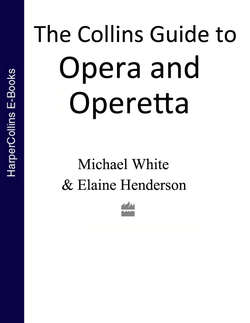Читать книгу The Collins Guide To Opera And Operetta - Michael White - Страница 21
ОглавлениеWozzeck
FORM: Opera in three acts; in German
COMPOSER: Alban Berg (1885–1935)
LIBRETTO: Alban Berg; after Georg Büchner’s play
FIRST PERFORMANCE: Berlin, 14 December 1925
Principal Characters
Wozzek, a soldier Baritone
Marie, his common-law wife Soprano
Andres, Wozzek’s friend Tenor
Drum-Major Tenor
Doctor Bass
Captain Tenor
An Idiot Tenor
Synopsis of the Plot
Setting: Outside a garrison town; around 1820
ACT I While Wozzeck is shaving him, the Captain amuses himself by teasing the soldier who agrees with everything the officer says until the Captain suggests that Wozzeck, with a mistress and a child, has no principles. Wozzeck’s response to this is that only the rich can afford principles. Later, Wozzeck and Andres are cutting sticks in a field when Wozzeck suddenly hallucinates, seeing the whole world as if on fire and hearing noises underground. Meanwhile, Marie is at their home, observing the soldiers marching by her window and, in particular, the Drum-Major. Wozzeck bursts in and tries to tell her of his experience in the field, but he frightens her and she rushes out. The next day Wozzeck relates his story to the Doctor, for whom he is acting as a paid ‘guinea pig’ for the Doctor’s bizarre nutritional experiments. The Doctor is delighted at what he sees as the result of his experiments and foresees great fame and fortune for himself. Marie, in the meantime, has succumbed to the blandishments of the Drum-Major.
ACT II The Doctor and the Captain taunt Wozzeck with Marie’s infidelity and he rushes home to confront her, threatening her with a knife, which he does not use. Wozzeck follows Marie to a crowded inn garden where he sees her dancing with the Drum-Major. Again, he is about to attack them, but the dancing stops before he can act. Alone and tormented, Wozzeck is joined by an Idiot, who tells Wozzeck that the scene before them, although apparently a happy one, is in fact reeking with blood. In his disturbed state of mind Wozzeck begins to be obsessed by the image of blood. Later, in the barracks, he and the Drum-Major fight and Wozzeck is knocked to the ground.
ACT III Marie, overwhelmed by guilt, walks with Wozzeck in the country. A blood-red moon rises over the scene as Wozzeck draws his knife and stabs her to death. He returns to the inn, where his bloodstained hands are noticed and, as a crowd gathers, he stumbles back to the murder scene to search for the knife. In his tormented mental state he imagines himself to be covered in blood and walks into the pond to clean himself, going deeper and deeper until he drowns. At their home, Wozzeck and Marie’s child unconcernedly plays with his hobby-horse before, finding himself alone, he goes in search of his friends.
Music and Background
Easier on the ear than the later Lulu, Wozzeck is a dissonant score that manages to be lyrically seductive and betray little of the complex formal structures by which everything is governed. Act II is designated, rather clinically, a ‘Symphony in Five Moments’ and Act III a set of ‘Six Inventions’, but the writing is vivid, passionate, sympathetic in its treatment of the anti-hero, and disturbing in its sardonic incorporation of popular street music (a device Berg borrowed from Mahler’s symphonies and song cycles).
Highlights
The entire score aches with a sense of gathering catastrophe, but Act III, Scene 2, in which Wozzeck kills Marie as the moon rises, is an especially chilling moment; the Act III, Scene 4 interlude after Wozzeck’s own death is the climax of the piece; and the vignette of Wozzeck’s child murmuring ‘hopp hopp, hopp hopp’ as he goes on playing is as unsettling an end as that of any opera.
Did You Know?
The plot of Wozzeck is based on a real murder which took place in 1824; a German critic at the first (incomplete) performance ‘had the sensation of having been not in a public theatre but in an insane asylum. On the stage, in the orchestra, in the stalls – plain madmen.’
The opening night was preceded by no fewer than one hundred rehearsals.
Recommended Recording
Eberhard Waechter, Anja Silja, Vienna Philharmonic Orchestra/Christoph von Dohnanyi. Decca 417 348-2. A striking performance from the then husband-and-wife team Dohnanyi and Silja, with Schoenberg’s Erwartung as a bonus filler.
